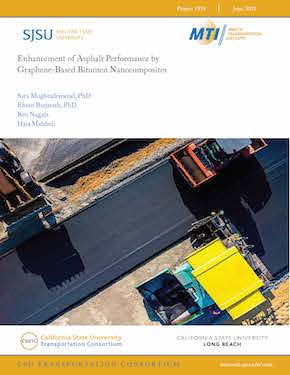- 408-924-7560
- mineta-institute@sjsu.edu
- Donate
Enhancement of Asphalt Performance by Graphene-Based Bitumen Nanocomposites
As the State of California continues to grow, demand for enhanced infrastructure such as roadways and highways escalates. In view of the current average highway lifespan of 15–20 years, the improvement of asphalt binders leads to material sustainability by decreasing required maintenance and increasing the lifespan of roadways. In the present investigation, enhancement of asphalt binder properties was achieved by different methods of mixing varying compositions of graphene nanoparticles with an SBS polymer and asphalt binder. Additionally, experimental evaluation and comparison of the rheological and mechanical properties of each specimen is presented. Graphene nanoparticles have attracted great curiosity in the field of highway materials due to their incredible rigidity, even in small quantities. Addition of as little as 1.0%nanoparticles in combination with polymers in an asphalt binder is expected to increase the rigidity of the material while also maintaining the beneficial polymer characteristics. Evaluation of the effect of the mixing design established that the methods for application of graphene to the polymer-modified asphalt binder are critical in the improvement of a roadway, resulting in resistance to premature aging and strain from constant road operation.
SARA MOGHTADERNEJAD, PhD
Dr. Sara Moghtadernejad joined the CSULB Department of Chemical Engineering as an Assistant Professor in Fall 2018. Dr. Moghtadernejad’s Multiphase Flow Lab (MFL) pursues various interdisciplinary and multidisciplinary research directions in Chemical Engineering. She studies processes and phenomena involving fluid and powders that depict phase changes and have multiple states. All of her research arises from practical applications, with the aim of solving challenging and contemporary industrial issues. MFL is a result-oriented laboratory and is equipped with state-of-the-art tools to closely reproduce real-life conditions and to design various interesting experiments. Those are followed by distinct numerical and statistical analyses to verify experimental observations and to provide solutions, enhancements, and corrections.
EHSAN BARJASTEH, PhD
Dr. Ehsan Barjasteh joined the CSULB Departments of Mechanical & Aerospace Engineering and Chemical Engineering (joint position) as an Assistant Professor in Fall 2015. His research focuses on development and optimization of advanced polymer and composite materials and processes. His research interests include manufacturing advanced composite materials using out-of-autoclave (OOA) processes, self-healing and repair of composite structure using smart materials, toughening advanced composite materials, life-time prediction and aging, 3D-printing of polymers for high-temperature applications, and progressive damage detection and analysis.
REN NAGATA
Ren Nagata attended California State University Long Beach for an undergraduate degrees and for graduate studies in the Chemical Engineering department.
HAIA MALABEH
Haia Malabeh attended California State University Long Beach for an undergraduate degree and for graduate studies in the Chemical Engineering department. Haia also holds a Professional Engineering License in Mechanical Engineering.
-
Contact Us
San José State University One Washington Square, San Jose, CA 95192 Phone: 408-924-7560 Email: mineta-institute@sjsu.edu






